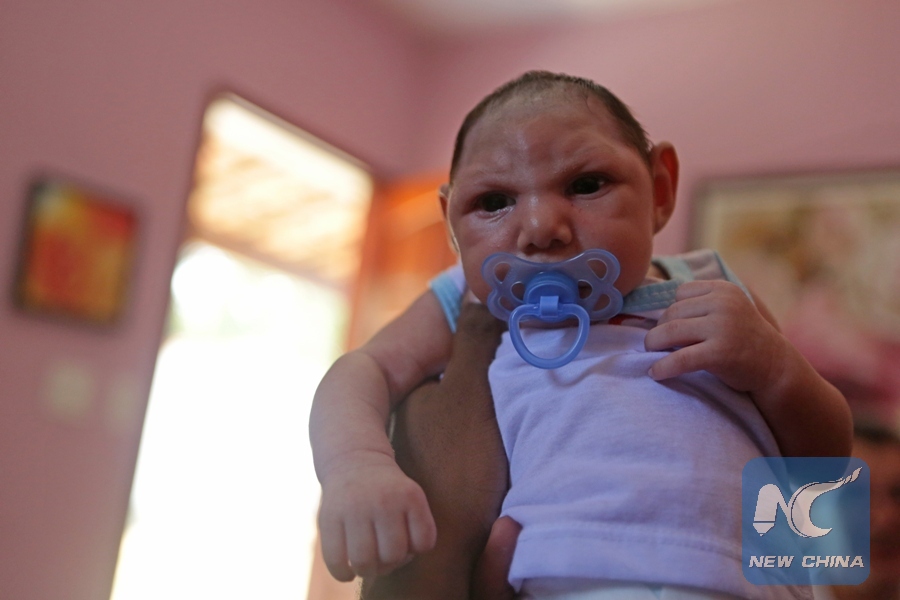- Joined
- May 21, 2009
- Messages
- 129
- Points
- 18

http://www.nbcnews.com/storyline/zi...-doubt-zika-virus-causes-birth-defect-n649536
This Study Removes Any Doubt Zika Virus Causes Birth Defect
by MAGGIE FOX
SHARE
advertisement
Brazilian researchers say they've removed any last vestige of doubt that Zika virus infection can cause an abnormally small head in newborns — a birth defect called microcephaly.
More than 40 percent of babies born with microcephaly had Zika virus in their bodies, compared to none of the healthy babies born at the same time and in the same place, the team reported.
Brazilian researchers say they've compared babies born to mothers infected with Zika to babies born to healthy mothers and found Zika really does cause a birth defect called microcephaly, marked by an unusually small head and underdeveloped brain.
This type of study, called a case-control study, can rule out other possible causes of microcephaly such as chemicals or pesticides, and provides a definitive answer to people who still doubt that the virus is causing the rise in birth defects.
Dr. Thália Velho Barreto de Araújo of the Federal University of Pernambuco in Recife and colleagues are comparing babies born with microcephaly in their hospital to babies born without the birth defect.
advertisement
They plan to test many more, but their preliminary findings show that 80 percent of the women who had babies with microcephaly tested positive for Zika virus infection, compared to 64 percent of women whose babies had normal-sized heads.
Related: Zika Doubled Birth Defect Rate in Brazil
And among the babies, 51 percent with microcephaly tested positive for Zika. None of the normal babies did.
"We conclude that the microcephaly epidemic is a result of congenital Zika virus infection," the team wrote in their report, published in Lancet Infectious Diseases.
"WE CONCLUDE THAT THE MICROCEPHALY EPIDEMIC IS A RESULT OF CONGENITAL ZIKA VIRUS INFECTION."
advertisement
"To our knowledge, our study is the first to estimate the seroprevalence of Zika virus infection in pregnant women in an epidemic area in Brazil."
Their study is comprehensive. They're including all infants born with microcephaly at eight public hospitals in the northeastern Brazil region hit hardest by Zika from January to May of this year.
"Controls were the first two infants born the following morning without microcephaly in one of the eight hospitals," they wrote.
"A high proportion of mothers of newborns with and without microcephaly had been infected with Zika virus, reflecting the rapid spread of Zika infection in this region. However, when we compared laboratory confirmed Zika virus infection in newborns with and without microcephaly, we found that about half of the cases with microcephaly had laboratory confirmed Zika virus infection, compared to none of the healthy controls."
advertisement
PlayHow Does Zika Cause Birth Defects? Facebook Twitter Google Plus Embed
How Does Zika Cause Birth Defects? 0:37
Zika's hard to test for, so it's possible many of the mothers had been infected with Zika but still tested negative. The longer ago someone was infected, the harder it is to find evidence of the virus in their blood.
Another question the study cannot answer: what proportion of women infected with Zika will go on to have babies with birth defects.
There's no doubt among experts that Zika causes microcephaly, other types of brain damage and other birth defects. The virus has been shown to go directly to developing brain cells; it gets through the placenta and into a developing fetus; it's been found in the brain and other organs of babies with microcephaly and other brain damage.
Related: Miami Protesters Fear Pesticides Are Worse Than Zika
advertisement
Zika is not the only cause of birth defects, but it's the first mosquito-borne virus to be shown to cause them. "Our findings suggests that Zika virus should be officially added to the list of congenital infections alongside toxoplasmosis, syphilis, varicella-zoster, parvovirus B19, rubella, cytomegalovirus, and herpes," the team wrote.
They did find that many of the women had evidence of other infections as well, especially dengue virus, which is related to Zika and is carried by the same mosquitoes. Some experts have suggested that people who have had dengue before may be more susceptible to the effects of Zika and Velho Barreto de Araújo says this needs further investigation.
"OUR FINDINGS SUGGESTS THAT ZIKA VIRUS SHOULD BE OFFICIALLY ADDED TO THE LIST OF CONGENITAL INFECTIONS."
It's also possible that some babies are being misdiagnosed with microcephaly, said Dr. Patricia Brasil of UCLA.
"Infants might be diagnosed with microcephaly when in fact they are globally small—ie, small for gestational age, without true isolated microcephaly," Brasil wrote in a commentary.
"This issue deserves attention, especially because in-utero growth restriction leading to the birth of small-for-gestational age infants is also a feature of congenital Zika virus syndrome."
Related: Questions About Pregnancy and Zika
Zika has swept through parts of Brazil, most of Latin America and the Caribbean and is now causing small outbreaks in south Florida. It's been carried around the world by tens of thousands of travelers and it's affected thousands of pregnancies, if not more.
Some people have protested against mosquito control efforts, expressing doubt that Zika actually causes brain damage and saying the pesticides could be worse than the virus. Pediatrics groups, the Centers for Disease Control and Prevention and the World Health Organization all say Zika's a global emergency and, given that there is no treatment for Zika and no vaccine to prevent it, the best possible course of action is to fight mosquitoes.
Last edited:

